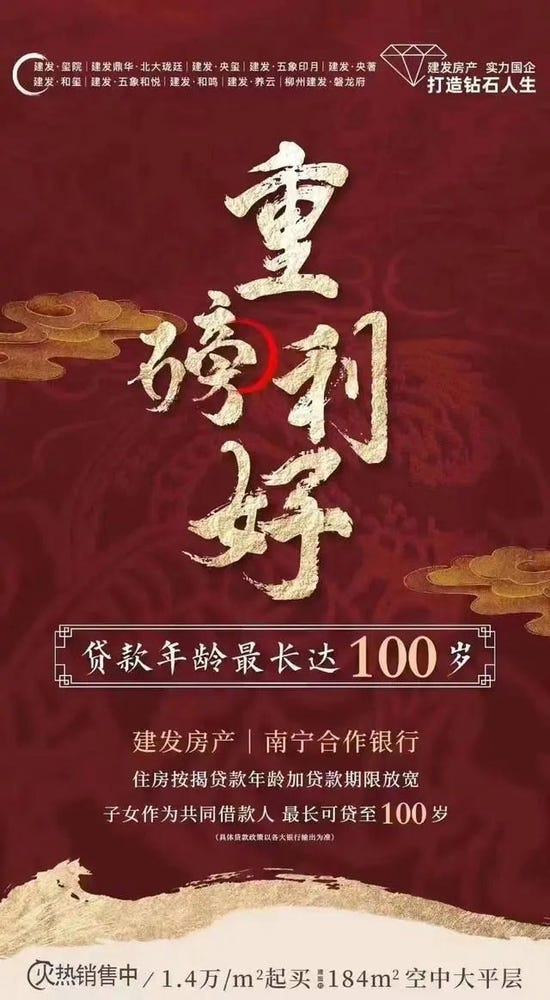Welcome to RealTime Mandarin—a multimedia resource to immerse you in the latest Chinese language trends, inspire you to practice and improve your Mandarin every week, and empower you to communicate with confidence.
Subscribe now to get the next issue straight to your inbox!
Some banks in the cities of Nanning, Hangzhou, Ningbo and Beijing have extended the upper age limit on mortgages to 80 and even 90 years old.
Internet users in China have invented idiomatic puns criticising the policy. They play on the use the character for "debt" (贷 dài), which is pronounced the same as the word for "generation" (代 dài).
Social media comments containing new idioms about “debt” and “generations” include:
贷贷相传 dài dài xiāng chuán - "indebted for generations", instead of passing from one generation to the next (代代相传 dài dài xiāng chuán);
世世贷贷 shì shì dài dài - "in debt generation after generation" instead of generation after generation (世世代代 shì shì dài dài);
子孙后贷 zǐ sūn hòu dài - "next generations are in debt" instead of future generations (子孙后代 zǐ sūn hòu dài).
Discussions in the media are a bit more balanced. One view is that it’s a good way to generate economic activity, and that people should trust the markets:
Many people ridiculed banks for raising the maximum repayment age for lenders. This is essentially a lack of trust in the market. A ‘relay loan’ is just market behaviour. Of course, it is risky for banks, but as a rational market entity, how can banks not be aware of the risks involved? Banks have always been the place with the strictest risk controls and the place where the risk-benefit ratio is the most important. The real risk often does not come from the business itself, but from irrational market intervention.
许多人嘲笑银行提高贷款人的最高还款年龄,本质上是对市场化的不信任。“接力贷”只是一种市场行为,它当然于银行来说有风险,但作为理性市场主体,银行岂会不清楚这里面的风险?银行历来是风控最严格的地方,也是最讲风险收益比的地方,真正的风险往往不是来自于业务本身,而是来自于不理性的市场干预。[1]
So that’s what we explore this week: The language of debt and death.
Favourite Five
1. 韭菜 jiǔ cài
garlic chives; the gullible
银行就是希望贷贷相传呗,不怕,韭菜会给出答案 - The bank wants to see the debts passed down to the next generation. They are not worried, because the people will pay. [5]
Note: Garlic chives are a metaphor for “the gullible” which comes from the phrase 割韭菜 gē jiǔcài - to rip the people off. But just like garlic chives which grow back quickly, the next crop of gullible customers is not far behind.
2. 愚公还贷 yú gōng huán dài
Passing your debts onto the next generation
以前愚公移山子孙无穷尽也,现在愚公还贷,子孙无穷尽也 - In the past, the Stupid Old Man moved mountains to secure a better life for his descendants. But now he repays the loan while he is alive, and passes the debt onto his next generation. [5]
Note: Inspired by the idiom, the Stupid Old Man moves the mountain (愚公移山 yú gōng yí shān), which we discuss more in The China Project Phrase of the Week.
3. 传宗接贷 chuán zōng jiē dài
passing debts from generation to generation
刺激房地产市场,不见得非要采用“传宗接贷”式的按揭贷款方式 - Stimulating the property market doesn’t have to be done by burdening people and their next generations with mortgages. [3]
Note: From the idiom 传宗接代 - continue the bloodline.
4. 千秋万贷 qiān qiū wàn dài
indebted for generations
网友将这波房贷政策松绑戏称为“千秋万贷”、“贷贷相传”,但实情可能并非如此片面 - Internet users jokingly described this round of mortgage policies as “indebted for generations”, “debt is passed on from generation to generation”. But in actual fact it’s not like that. [2]
Note: From the idiom 千秋万代 qiān qiū wàn dài - 'a thousand autumns and ten thousands generations', which means 'for generations'.
5. 家祭无忘告乃翁 jiā jì wú wàng gào nǎi wēng
remember to let me know the good news when sweeping my tomb
房子贷款还清日,家祭无忘告乃翁 - When the mortgage is paid, don't forget to share the good news with your parent (who has passed away). [5]
Note: The last line in the Lù Yóu 陆游 poem, To My Son 示儿 shì er. It’s probably the Song dynasty poet’s most famous work, in which he expresses regret that China is still not united when he dies, asking his son to tell him when it does finally happen when sweeping his tomb.
Consuming the Conversation
Useful words
6. 炒房 chǎo fáng
buying properties as an investment not to live in
他们不囤房不炒房,改善型这一类老年人大多财务状况健康 - They do not buy up or speculate on real estate. Elderly who buy to improve their living conditions tend to be financially healthy. [1]
7. 杠杆 gàng gǎn
leverage
在高房价的背景下,不加杠杆,就意味着房子卖不动 - In the context of high housing prices, with no leverage houses cannot be sold. [2]
More: Zoe explores this word and how to use it in the podcast.
8. 掏空 tāo kōng
empty out
以前是掏空爹的存款,现在是掏空儿的存款 - It used to be spending their parents' savings (on a house). Now, the parents will be borrowing from their kids. [5]
9. 苛责 kē zé
very harsh
社会大众无需苛责,‘非黑即白’的评价模式,不利于各地政策的因城施策开展 - There is no need for the public to be so critical. Black and white thinking is not conducive to the targeted implementation of local policies. [2]
10. 血液 xuè yè
blood, cashflow
促进就业,增加居民的收入,就是增加市场的流动的血液 - Promoting employment and increasing the household income increases the flow of cash in the market. [3]
Note: 吸血 xī xuè - blood sucking, taking people’s money
11. 流水 liú shuǐ
flowing water, cashflow
银行已经核实贷款人收入流水满足贷款要求 - The bank has verified that the borrower's income flow meets the loan requirements. [4]
Note: Blood and water are both used as metaphors for cash. water metaphor is more microeconomic (personal & business ect.), but blood is more macroeconomic (markets).
12. 默许 mò xǔ
acquiescence; accept
这说明,至少银行已经默许了这种情形的存在 - This shows that at least the bank has accepted this situation. [1]
Three-character phrases
13. 啃老团 kěn lǎo tuán
gnawing old group; people who live off their parents
除了保健品、电信诈骗、啃老团以外,终于又看上老年人的退休金了 - In addition to health supplements, scam calls, and people living off their parents, finally they have got their eyes on the pension pots of the elderly. [1]
Related: 啃老 kěn lǎo to sponge off one's parents. A social media slang we looked at last July.
14. 接力贷 jiē lì dài
relay loan















